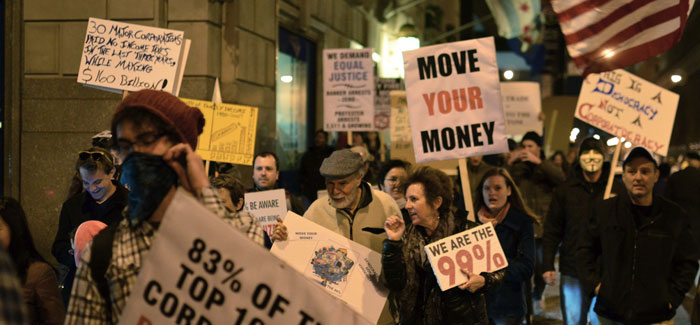
Grant Park protests in 2011 prompted arrests—and a ruling against the city. (Photography by Michael Kappel,CC BY-NC 2.0)
A law professor helps student protesters arrested at an Occupy Chicago rally fight for their rights.
The class was on, of all things, theories of punishment. Bernard Harcourt was teaching it in the fall of 2011 when 12 of his students were arrested in Grant Park at an Occupy Chicago protest. They were charged with violating the park’s curfew: no visitors between 11 p.m. and 4 a.m.
Harcourt, the Julius Kreeger professor of law and criminology and chair of the political science department, believed his students’ First Amendment rights had been violated. He set out to make it right, starting with finding them legal representation. One of the city’s best-known defense attorneys, Tom Durkin, happened to be in the same class as a graduate student at large. Durkin agreed to take the case pro bono, as did Harcourt’s research assistant, Gabriel Mathless, JD’11.
This past September, a Cook County Circuit Court judge dismissed the charges against the 12 students whom Durkin and Mathless defended, as well as about 80 other protesters arrested at the same time. The city has appealed the ruling.
The defense argued that the charges should be thrown out because the curfew law didn’t serve a significant government interest, the city didn’t leave alternate channels for the protesters, and the law was not content neutral because it was not applied consistently—for example, the Grant Park celebration after President Barack Obama’s 2008 election lasted well past 11 p.m.
Mayor Rahm Emanuel, discussing the city’s plan to appeal, criticized the comparison between the Occupy protest and the Obama rally, telling WBEZ that it was “apples and oranges.” There was a permit for the rally, Emanuel said, and the crowd did not plan to spend the night. “Those are kind of fundamental differences.”
The students were arrested on October 16, 2011. Along with other protesters, they were handcuffed and transported in police vans to various stations where they were held, in some cases, for more than 17 hours.
Harcourt, who had been writing op-ed pieces about the Occupy movement for the Guardian and the New York Times, stepped in to to help because “I feel a certain amount of responsibility for my students, particularly when it’s in an area I’m very familiar with, policing and punishment. I feel a responsibility to protect them from some of the excesses of the criminal justice system.”
Mathless, now a litigator at Ginsberg Jacobs LLC, was working for Harcourt on a legal and social theory project. Four days after he was sworn into the Illinois bar, Mathless attended a bail bond hearing to represent one of the defendants. “The Occupy case gave me my first courtroom experience as an attorney.”
On September 27, 2012, Judge Thomas More Donnelly dismissed the charges in a 37-page ruling that included a section on the history of Grant Park as a public forum. As early as 1836, Donnelly wrote, “what was to become Grant Park became the city’s ‘favorite spot for political rallies and expositions.’”
Mathless said he was “pretty stunned” by the ruling in favor of the protesters. “I had been expecting to lose, and I was already working on some possible appeals. … I thought we had the stronger argument, but we’re up against city hall and the City of Chicago, and they have a very large legal department and a lot of resources.”
After bringing Durkin and Mathless together to lead the defense, Harcourt edited their briefs and helped bring the case to the public’s attention. “He’s that rare combination,” Durkin said, “of someone who can connect the practical with the theoretical.”
